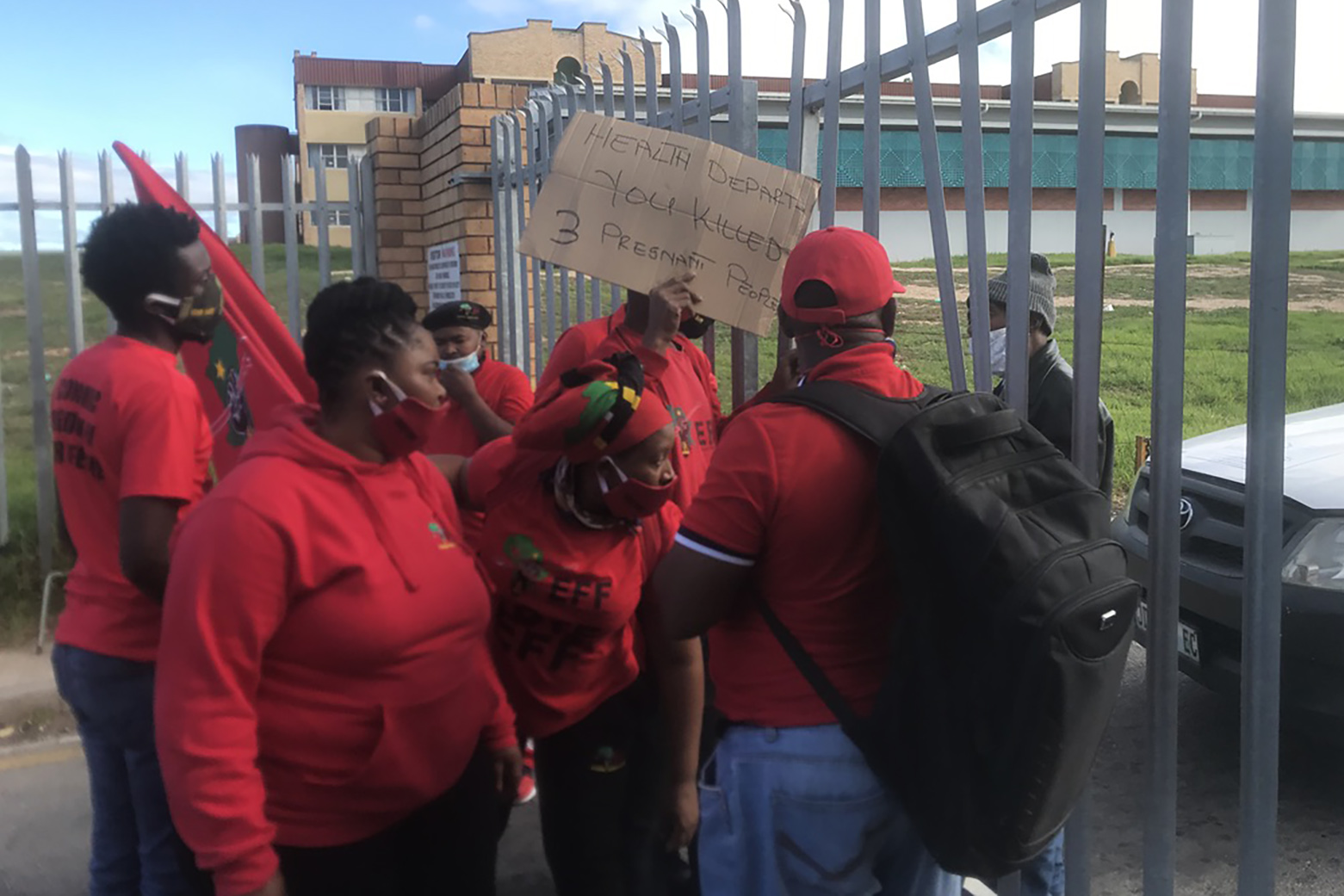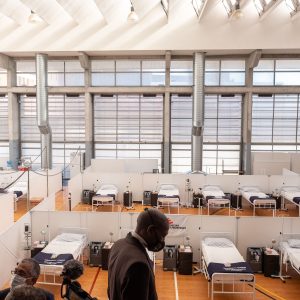Port Elizabeth hospitals flooded as clinics close
There are not enough medical personnel in the Nelson Mandela Bay metro to keep all its public health facilities open – even as patient numbers spike due to the coronavirus pandemic.
Author:
1 July 2020

Patients in the Eastern Cape’s Nelson Mandela Bay metro who usually receive primary healthcare at government clinics in Port Elizabeth are “overwhelming” the city’s public hospitals in search of treatment after Covid-19 outbreaks resulted in several clinics closing.
At the 570-bed Dora Nginza Hospital in Zwide, midwives and nurses in the maternity unit had to work a full 24 hours on 28 June when staff on the second 12-hour shift did not come to work. This led to a protest on 29 June against the provincial Department of Health’s failure to manage the pandemic. The protest held by the local branch of the Economic Freedom Fighters (EFF) was joined by a few doctors and nurses from the hospital when they blockaded the gate.
The coronavirus has wreaked havoc in Port Elizabeth’s clinics and local obstetric wards, some of which have closed after nurses either contracted Covid-19 or went into isolation while waiting for their test results.
A Dora Nginza emergency department doctor, who asked not to be named, said the staff had given the hospital’s chief executive, Patrick Tsibolane, a memorandum with grievances and concerns on 15 June, but nothing had improved. “People are dying every second inside this hospital,” said the doctor.
Related article:
“Nothing has happened until today, so we are tired now. The Eastern Cape Department of Health is in crisis. The ship has long sunk. There are corpses inside the hospital – it is smelling, there is no human dignity. It is overcrowded. We just need ubuntu, humanity. Our people are lying like dogs here inside.”
There were media reports last week about the shocking state of affairs in the hospital: a nurse died of Covid-19, a patient died after there was not a single nurse to care for her, and several women in labour were forced to give birth on the floor in corridors.
The hospital is currently closed to the media.
Health system collapse
EFF activist Tawuya Mushaike, who was at the protest on 29 June, said a patient died after giving birth. “In the maternity ward, there were patients booked in for caesarean sections who could not have these for 14 days and eventually some of them gave birth on the 15th day, which caused this death. If Dora Nginza is a reflection of what is happening in the public health system in the Eastern Cape, then it has already collapsed.”
Msindisi Makeleni, the EFF’s head of the public health, water, sanitation and electricity portfolio in Nelson Mandela Bay, said the party will shut down the hospital completely if member of the executive committee (MEC) for health Sindiswa Gomba and department head Thobile Mbengashe are not fired by next week. Doctors and nurses told the EFF at the protest to go further than blockading the gates for a few hours and “shut down everything”.
Last weekend, a “district recovery plan” was hurriedly devised by some hospital managers, members of the provincial government and representatives of the Congress of South African Trade Unions (Cosatu). According to the internal document, the “major challenge” at Dora Nginza Hospital is the “overflow due to closure of clinics and community health centres”. Its assessment of this situation is that staff are demoralised, “burnt out and about to give in and collapse”.
Related article:
The plan recommends that no clinic should be allowed to close without Gomba’s permission, even if there is an outbreak of Covid-19. It also says unqualified midwifery students must be brought in to work under supervision, and discusses establishing a radiology unit at the Motherwell Community Health Centre – a long-term project that will not help the Dora Nginza medical staff during the pandemic.
“This ‘recovery plan’ is so substandard that it will be useless to point out where it needs improvement as it barely touches on core issues,” said Makeleni, adding that the head of maternity services at Dora Nginza, Mfundo Mabenge, was not even consulted on the plan because he is not part of Gomba’s inner circle. “The ANC deployees are a virus themselves and demoralise our qualified health workers,” he said.
Sick and tired
Nosipho Matya, a shop steward for the National Education, Health and Allied Workers’ Union, said many nurses and other staff at the hospital are infected with Covid-19. “We have a staff shortage on top of that. It is a serious shortage and we have tried calling [Gomba] and all those people from Bhisho [provincial government]. They don’t care about Dora Nginza – they want Dora Nginza to collapse.”
Matya described a meeting in the maternity unit on 26 June at which all the staff, including doctors, said they had already reached the point where they could not run a safe facility. “We didn’t resolve anything at that meeting because when we tried to phone [Gomba], she became rude.” Matya said nurses are not respected by management and have to eat their lunch in a toilet.
Public hospital nurses are now pitted against those at clinics in the city, something that government officials appear to be encouraging. A WhatsApp voice note from an Eastern Cape leader of the Cosatu-affiliated National Union of Public Service and Allied Workers to its members says management at Dora Nginza Hospital has told nurses that their counterparts at clinics “enjoy” shuttering their facilities so that they can stay home for 14 days without even getting tested.
“The influx … and the closure of clinics … yoh! It’s Dora Nginza’s responsibility now … even the clinics, it’s our responsibility … now. As a result, it’s as if Dora Nginza is not doing its job. People are uncared for,” the voice note says.
Chronic shortage
But Lindiwe Dumalisile, a clinic nurse and deputy general secretary of the South African Federation of Trade Unions-affiliated Young Nurses Indaba Trade Union said it is impossible to keep the clinics open when all the staff are either Covid-19-positive or waiting for their test results. Forcing nurses with positive test results to work would spread the virus further among patients and staff.
“The major problem is the chronic nurse shortage, which the health department isn’t willing to address. For example, women may give birth at the Motherwell midwifery and obstetric unit. They don’t need to go to Dora Nginza. But the [unit] is closed because the midwives who were allocated there are among the staff that are in quarantine,” she said.
Related article:
“It has been cleansed and decontaminated, so if the department can deploy other midwives there, the problem at Dora Nginza Hospital can be resolved. But the problem is that the health department wants to recall nurses who are still in quarantine instead of addressing the shortage of nurses.”
The deputy director general at the department, Litha Matiwane, who was deployed by Minister of Health Zweli Mkhize to lead Nelson Mandela Bay’s response to Covid-19, would not comment on the demands made by the protesters. “We will have to look into it as I don’t see any clear issues here. We will respond soon.”
Department spokesman Siyanda Manana did not respond to questions.



